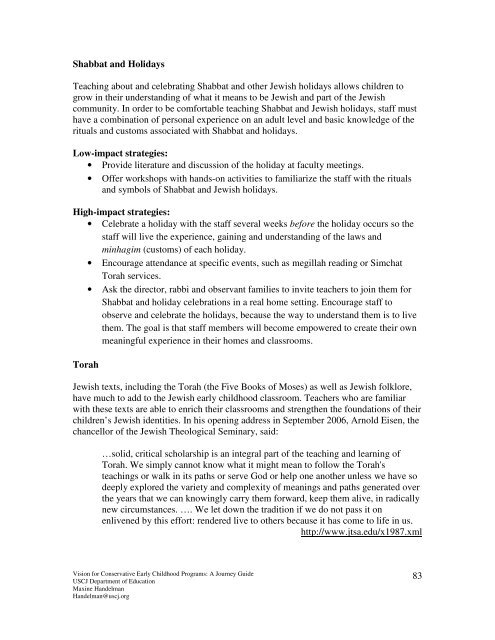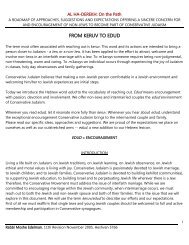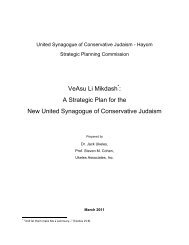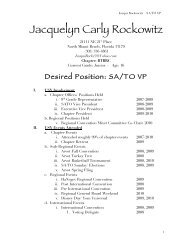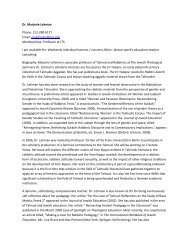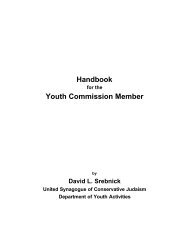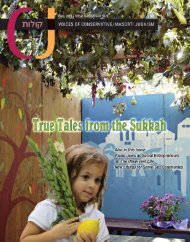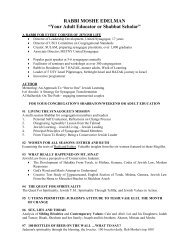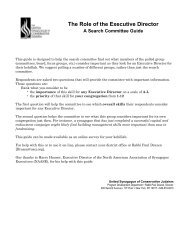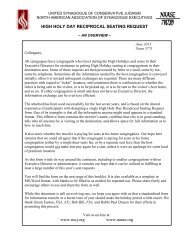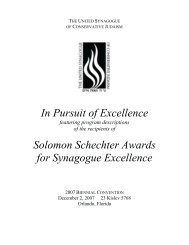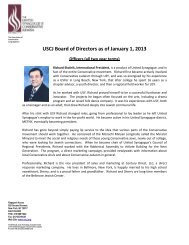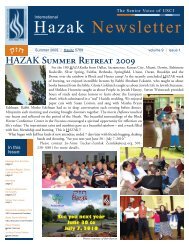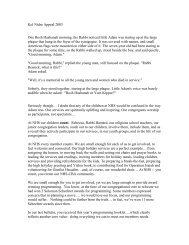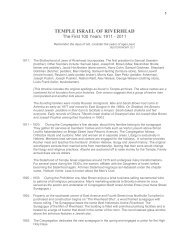Vision for Conservative Early Childhood Programs: A Journey Guide
Vision for Conservative Early Childhood Programs: A Journey Guide
Vision for Conservative Early Childhood Programs: A Journey Guide
You also want an ePaper? Increase the reach of your titles
YUMPU automatically turns print PDFs into web optimized ePapers that Google loves.
Shabbat and Holidays<br />
Teaching about and celebrating Shabbat and other Jewish holidays allows children to<br />
grow in their understanding of what it means to be Jewish and part of the Jewish<br />
community. In order to be com<strong>for</strong>table teaching Shabbat and Jewish holidays, staff must<br />
have a combination of personal experience on an adult level and basic knowledge of the<br />
rituals and customs associated with Shabbat and holidays.<br />
Low-impact strategies:<br />
• Provide literature and discussion of the holiday at faculty meetings.<br />
• Offer workshops with hands-on activities to familiarize the staff with the rituals<br />
and symbols of Shabbat and Jewish holidays.<br />
High-impact strategies:<br />
• Celebrate a holiday with the staff several weeks be<strong>for</strong>e the holiday occurs so the<br />
staff will live the experience, gaining and understanding of the laws and<br />
minhagim (customs) of each holiday.<br />
• Encourage attendance at specific events, such as megillah reading or Simchat<br />
Torah services.<br />
• Ask the director, rabbi and observant families to invite teachers to join them <strong>for</strong><br />
Shabbat and holiday celebrations in a real home setting. Encourage staff to<br />
observe and celebrate the holidays, because the way to understand them is to live<br />
them. The goal is that staff members will become empowered to create their own<br />
meaningful experience in their homes and classrooms.<br />
Torah<br />
Jewish texts, including the Torah (the Five Books of Moses) as well as Jewish folklore,<br />
have much to add to the Jewish early childhood classroom. Teachers who are familiar<br />
with these texts are able to enrich their classrooms and strengthen the foundations of their<br />
children’s Jewish identities. In his opening address in September 2006, Arnold Eisen, the<br />
chancellor of the Jewish Theological Seminary, said:<br />
…solid, critical scholarship is an integral part of the teaching and learning of<br />
Torah. We simply cannot know what it might mean to follow the Torah's<br />
teachings or walk in its paths or serve God or help one another unless we have so<br />
deeply explored the variety and complexity of meanings and paths generated over<br />
the years that we can knowingly carry them <strong>for</strong>ward, keep them alive, in radically<br />
new circumstances. …. We let down the tradition if we do not pass it on<br />
enlivened by this ef<strong>for</strong>t: rendered live to others because it has come to life in us.<br />
http://www.jtsa.edu/x1987.xml<br />
<strong>Vision</strong> <strong>for</strong> <strong>Conservative</strong> <strong>Early</strong> <strong>Childhood</strong> <strong>Programs</strong>: A <strong>Journey</strong> <strong>Guide</strong><br />
USCJ Department of Education<br />
Maxine Handelman<br />
Handelman@uscj.org<br />
83


